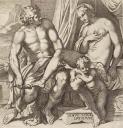One of my favorite authors, Ursula K. LeGuin, has written a book about my favorite subject: Ancient Rome.
 It’s called “Lavinia”, and the eponymous heroine is the legendary daughter of Latinus, King of the Latins, and the wife of Aeneas, hero of Troy, son of Venus and progenitor of the Julian clan. (For a quick and dirty rundown of the period, check out the remaining fragments of Appian’s History of Early Rome.)
It’s called “Lavinia”, and the eponymous heroine is the legendary daughter of Latinus, King of the Latins, and the wife of Aeneas, hero of Troy, son of Venus and progenitor of the Julian clan. (For a quick and dirty rundown of the period, check out the remaining fragments of Appian’s History of Early Rome.)
It’s no garden variety historical novel, though. For one thing, Lavinia has some understanding that she might actually be fiction, a creation of the poet Virgil whose shade she encounters in a sacred grove.
For another thing:
Lavinia makes for an unlikely heroine, which is just what Le Guin likes about her. From Mulan to Buffy the Vampire Slayer, sassy, kick-ass girls are preferred nowadays to circumspect homebodies like Virgil’s Latin princess. There may even be a touch of self-reproach in Le Guin’s choice of Lavinia as her main character, since the heroine of her 1971 novel, “The Tombs of Atuan,” is a priestess named Tenar who rebels against a life entirely devoted to serving a pantheon of nameless, implacable gods. Lavinia, by contrast, embraces the ritual aspect of her designated role, all the humble and solemn daily sacrifices, the scattering of sacred salt, the tending of clan totems, and even her own fate, as a woman destined to have little choice in who her husband will be.
To be fair, the Tombs of Atuan aren’t anywhere near as appealing a childhood home as the bucolic hills of central Italy, and Lavinia wasn’t snatched from her parents as a wee sprog to be raised by servile eunuchs and cold priestesses.
Amazon tells me I’ll have “Lavinia” by Tuesday. A book report will ensue. :boogie: